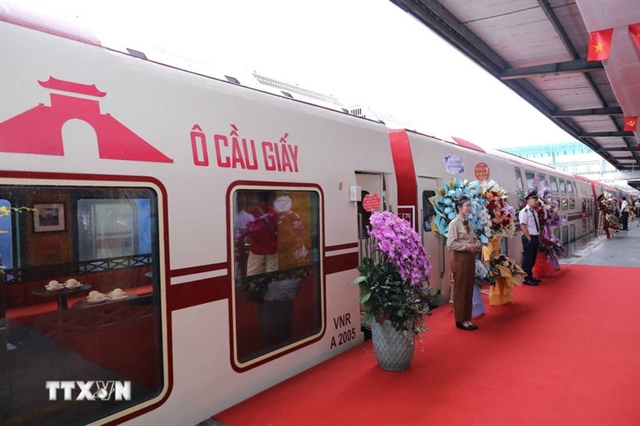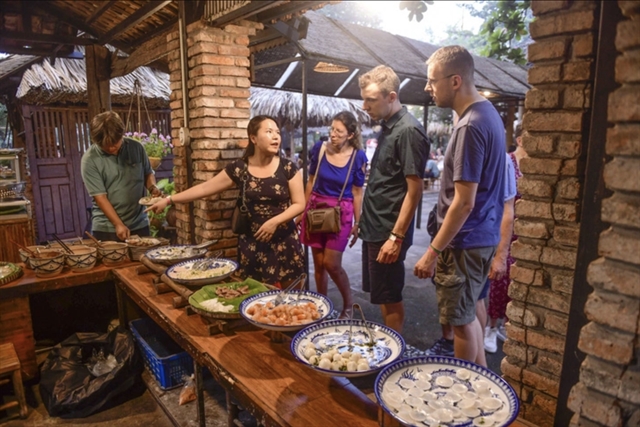 Life & Style
Life & Style

 |
| A group of foreign tourists visit Bình Quới tourism village in Bình Thạnh District. Photo tuoitre.vn |
HCM CITY - The number of international visitors looking for accommodation in Việt Nam for long holidays in the last months of the year is forecast to increase significantly thanks to the new visa policy.
Starting from August 15, electronic visas (e-visa) will be extended from 30 to 90 days.
Additionally, citizens of countries unilaterally exempted by Việt Nam from visa requirements will see their temporary residence permits increase from 15 to 45 days, and their visa applications and temporary residence extensions will be considered as per regulations.
With these more open visa policies, opportunities to stimulate tourist spending and keep visitors for longer stays are expanding, and the creation of continuous tours through countries is being revitalised.
Đoàn Thị Thanh Trà, director of marketing and communication at Saigontourist Travel, said that as soon as the new policy was announced two months ago, their company worked with partners to adjust and update products accordingly.
After the pandemic, foreign markets were requiring Việt Nam’s tourism industry to refresh its products, and products for the international market needed to be redesigned.
However, businesses could make use of longer guest stays to develop tour programmes based on the criteria and regulations of the expanded lenient visa policy.
"Besides casual tourists, various business groups that frequently enter and exit Việt Nam have the tendency to book necessary services in advance. When working with these partners, travel products are always designed based on visa conditions. Visa-free countries will receive different offers compared to those with visa requirements,” Trà said.
She added that longer-duration tours, connecting with Laos and Cambodia, had become much easier to implement.
Some other tourism agencies hope the new visa policy will positively impact and potentially increase the number of international tourists coming to Việt Nam by 5 to 25 per cent each year.
"Previously, creating consecutive tours involving three countries was quite a struggle. If foreign tourists wanted to travel to neighbouring countries, they had to apply for visas again. Many of them eventually decided to leave Việt Nam even though they wanted to stay longer," a representative of a travel firm said.
European tourists coming to Việt Nam often have to take long round-trip flights with expensive airfare, leading them to plan for more extended vacations compared to tourists from nearby regions, according to the representative.
When Việt Nam’s visa policy was less open, these trips had to be shortened. It is crucial to note that this is a group of high-spending tourists who wish to spend more time in Việt Nam.
Nguyễn Ngọc Toản, CEO of Images Travel & Events, also anticipates an increase in the number of tourists but believes this increase will come from individual travellers, while group travellers through travel agencies might need more time to adjust.
Pulling visitors back again and again
Jürgen Dörr, CEO of Vinpearl Holdings, believes that the next step after the new visa policy is direct flights.
"Visas are just the beginning. Convenient flight routes can bring tourists to destinations," he said.
During the last months of the year, travel businesses need to develop quality products that emphasise experiential factors and offer flexible services to tourists, such as flexible departure times and itineraries, according to the expert.
That being said, a larger number of tourists means that relevant authorities need to ensure stable pricings across all localities.
International tourists appreciate experiences linked to the daily lives of local people, street food, and local eateries, but they need to be effectively managed to avoid issues like price gouging, improper pricing, hygiene concerns, and environmental issues.
According to Nguyễn Ngọc Hoài Nguyên, CEO of BenThanh Tourist, after the pandemic, domestic travel companies are facing a reality of fewer service options, leading to higher product prices and reduced competitiveness compared to other countries in the region.
"Nowadays, customers demand information about what activities to do, what to eat, and the quality of service. It will be challenging for local companies if they do not stay updated,” Nguyên said.
Toản added that while the visa policy had become more lenient, how it would be implemented was also a concern for businesses.
In practice, occasionally tour groups still encountered challenging situations with e-visa procedures.
For instance, a guest in a group was once left behind during the immigration process in Việt Nam due to a minor misspelling in their name. And the company had to transport the guest to Laos to wait for a new visa.
"We have a lenient policy, but there needs to be a flexible process and guest-oriented attitude as well," Toản suggested. VNS